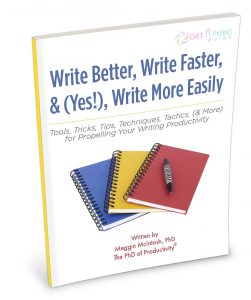Growing as a Writer by Gini Cunningham
 As writers, we grow and change. Most of us can look back at some of our earlier pieces and wonder how some of them got published – and others, we KNOW why they didn’t get published. Of course, if you look back, you also find amazing pieces that you now need to revive…but that’s another set of top tens. This week, let’s just think about the overall concept of being productive in our growth as writers…
As writers, we grow and change. Most of us can look back at some of our earlier pieces and wonder how some of them got published – and others, we KNOW why they didn’t get published. Of course, if you look back, you also find amazing pieces that you now need to revive…but that’s another set of top tens. This week, let’s just think about the overall concept of being productive in our growth as writers…
- Examine your writing over time. You will see growth once you have yourself installed in the “Writing Every Day” pattern. The more you write, the better you write, the better you write, the more you will want to write. It is a delightful merry-go-round that you will never want to exit.
- Visualize writing excellence. Once you have set your writing goal, bring it to life in your mind as you clarify the purpose and the product. See it, feel it, sense it, hear it… it even might have a particular taste.
- Read and write; write and read. Read a favorite book and analyze what makes it great. Read more great books to determine links to greatness. Analyze what makes writing impressive; critique writing that leaves you dull and depleted. Incorporate the best traits into your writing regime.
- Join or create a writing group live or on-line. Determine parameters for writing and sharing writing: when and where to meet, rules for sharing, rules for feedback, time limits/word limits. Decide ahead of time your precise goals for your writing group and tweak as needed. Planning ahead will alleviate and eliminate many problems such as coming late, not sharing, overshadowing…
- Enter writing contests: poetry, short stories, novel in a month, etc. See what you can produce. See what you can learn.
- Read your writing aloud – to yourself, to a friend, to a writing group. The spoken word flows differently than the written word. Use this oral practice to enrich your writing with vocabulary that has rhythm and rhyme.
- Find joy, satisfaction, and power through writing. If you aren’t finding some joy and relaxation along with empowerment, shift your writing goal or style. Greatness is there but you may need to dig to uncover it.
- Focus on your writing to address the needs, educational level, and attention span of your audience. One topic may take several forms for example, “Encouraging Young Writers.” You will need the kid version, the teacher version, the parent version, the sibling version… Same topic but multiple angles.
- Share your writing with people you trust. As you hand over your work tell the person exactly what you want: spelling correction, attention to sentence structure, flow of your message, staying on a given topic… some folks will just want to tell you too much while others cannot move beyond “Good job!” Your guidance for their feedback will be valuable.
- Seek means of publication: your own personal journal, online with sites like http://ezinearticles.com/, self-publish with sites (ask around and make sure they are reputable and EASY to use, or seek a publishing firm who contracts your work. Seeing your endeavor in print is a powerful motivator for more writing exploration and excitement.
© Gini Cunningham (adapted from her book, The New Teacher’s Companion: Practical Wisdom for Succeeding in the Classroom (ASCD). In addition to her writing, Gini is an author, workshop leader, and consultant who provides education for educators. Through her consulting work, she provides (and guarantees): Full, undivided focus on your work, straightforward feedback and much more! Contact her at: gini.cunningham@sbcglobal.net
 Whether you write for pleasure, to discover, to get paid, as a part of your work, as a way to instruct, or for any other purpose, streamlining your writing process is essential. The Get a Plan! Guide® to Writing Better, Faster, & (Yes!) More Easily: Tools, Tricks, Tips, Techniques, Tactics, & More for Propelling Your Writing Productivity.
Whether you write for pleasure, to discover, to get paid, as a part of your work, as a way to instruct, or for any other purpose, streamlining your writing process is essential. The Get a Plan! Guide® to Writing Better, Faster, & (Yes!) More Easily: Tools, Tricks, Tips, Techniques, Tactics, & More for Propelling Your Writing Productivity.
Inside this essential Get a Plan! Guide, you’ll find nearly 70 practical, easy-to-implement ideas that will propel your writing productivity.




